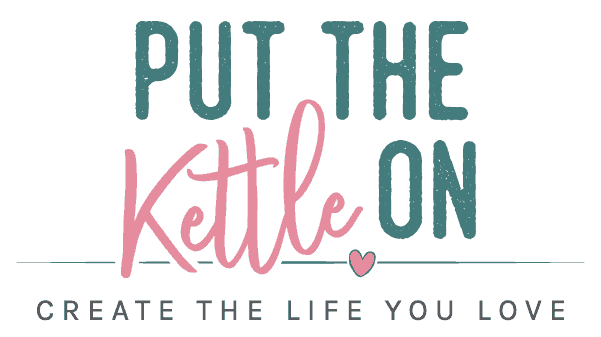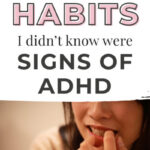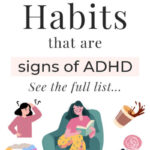18 Habits & Traits I Didn’t Know Were Signs of ADHD

Today I’m sharing 18 habits and traits I had no idea were linked to ADHD.
For years, I’ve been extremely hard on myself for so many reasons. Many times, I just felt different, but I had no idea it was due to ADHD until I began fitting all of the pieces together when I was diagnosed earlier this year.
I have dealt with depression from my pre-teen years and anxiety much earlier, but I had no idea that some of this depression and anxiety was directly linked to ADHD.
That is, until I began taking ADHD medication and my depression went away overnight.
So today I want to share many experiences and habits I’ve found challenging in life that I was extremely hard on myself for – until I found out it’s actually ADHD that is linked to these behaviours.
Knowing these habits are due to ADHD allows me not to be so hard on myself because these things are not all in my control.
Let’s get into the examples, plus how these habits and behaviours relate to ADHD symptoms.
I’m breaking down the ADHD habits into the following categories:
- Relationships and social interactions
- Focus and productivity
- Physical habits & traits
- Mental health
- Quirky ADHD habits

Relationships & Social Interactions
1. Social Anxiety/Feel like a social outcast
This started when I was young, and it never went away.
Over the years, many people have thought I was stuck up when, in reality, I was just scared to enter a social situation, so I stayed quiet or got in and out quickly.
I identify as an introverted extrovert. Someone who’s introverted in many social situations where I can’t be my true self, but extroverted among people I am closest to and feel comfortable around.
Due to feeling this way, I have missed out on important occasions (weddings, birthdays) and on career advancement.
Experts don’t know exactly why ADHD and social anxiety tend to co-occur, but some think that the factors that play a role in ADHD, genetics, environmental toxins, or premature birth (I was born 2 months early), can also influence anxiety disorders.
Knowing that social anxiety tends to occur more frequently in ADHD children and adults helps me see that I haven’t done something wrong. This awareness allows me to be less hard on myself.
2. Being Bullied In Childhood & Adulthood
I was that kid that multiple bullies took pleasure in tormenting – luckily, not all at the same time – they took their turns.
As a child, this bullying made me extremely self-conscious and shy. This led to removing myself from social situations where I thought bullying might come after me.
Example: School Halloween dance circa 1988, where I spent my time in the library even though I had the most amazing old lady costume. They tried to give me an award (even though I wasn’t at the dance), and because I was scared to go into the gym where the dance was taking place to accept my best dressed costume award, I immediately ran home. I was mortified the next day when everyone asked why I had left running. Ugh!
I was also bullied as an adult in my most recent corporate job. I won’t get into it – but the person knows who they are.
This study, which focused on 6 to 17-year-olds, revealed that among the children with ADHD, 46.9% were bullying victims.
This can happen due to ADHD kids more often due to difficulties reading social cues, struggling academically, or being clumsy, to name a few things – essentially for being different (source).
3. Hard Time Listening/Hearing
It can be hard to understand what someone is saying if there is ambient sound or the background environment has a lot of noise.
For example:
If someone is trying to talk to me in a loud restaurant, I usually end up saying ‘pardon, ‘can you repeat that,’ or ‘I’m hard of hearing’ so many times, and in the end, I just pretend I can hear (because I don’t know what else to do).
I know this means my response to what the person is saying may sound off, but I’m doing my best.
This can also happen if someone is talking to me while there’s music playing, TV, or anyone else in the room is talking at the same time.
People think I can’t hear, but I’ve had several hearing tests and my hearing is almost perfect.
I can hear the sound coming from people’s mouths, but trying to understand what they are actually saying is a whole different battle.
Due to this, I’ve been accused of not caring, not listening, being spacey, and showing a lack of interest.
This happens due to something called sound sensitivity, which is one of many sensory issues that can affect a person whose ADHD brain struggles to filter out irrelevant sensory input to focus only on the details and information that matter. (source)
What helps me now is just telling people that I can’t hear them because of all the other noise and then moving on – without feeling awkward.
This leads to…
4. Feeling misunderstood
People misunderstanding my intentions has been a struggle for me for my entire adult life.
This has impacted my career, whether in corporate or being self-employed, as well as my personal relationships.
Often, I want to help others, but it doesn’t come across that way. In other words, I have good intentions, but others might see me as trying to pry.
The thing I need to work on is taking cues from others and knowing who needs actual help and who just wants me to listen. I’m practicing asking if people need my help or if they just want to vent.
5. Assuming people don’t like me
Being bullied, feeling like a social outcast, and feeling misunderstood led me to assume most people don’t like me.
It wasn’t just a feeling of being disliked, but the evidence over the years that made me come to this conclusion.
Now, I’ve gone to a lot of therapy about this, and I’ve also come to understand that it’s impossible for everyone to like you – but for those who don’t, it can be difficult when I feel it’s because I am misunderstood.
This can be linked to something called Rejection Sensitive Dysphoria (RSD).
According to Additide Mag, RSD is…
“Extreme emotional sensitivity and pain triggered by the perception that a person has been rejected or criticized by important people in their life. It may also be triggered by a sense of falling short — failing to meet their own high standards or others’ expectations.”
6. People pleasing to the point of burnout
Constantly feeling I need to prove my worth – prove my value.
This happens at work and in my personal life until I just can’t function anymore.
In my personal life, I often agree to do more than I’m capable of, and then I end up letting people down when I have to cancel or when I’m sick from being overloaded.
At work, I tend to help many people out, but then don’t charge for my services (I’m self-employed). This ends up adding hours to each week and has led to burnout on many occasions.
Due to everything mentioned above… not feeling understood, good enough, and from a lifetime of being bullied, which means myself and other ADHD adults have a fear of rejection.
To support myself more, I’ve been practicing saying no over the years. It can still feel uncomfortable, but it’s a must, so I don’t completely burn out and become physically and mentally sick.
👉 Related: 10 Tips To Stop Being a People Pleaser
Focus & Productivity
7. Having an impossible time finishing tasks
I cleaned the garage out in May, but sitting here in October, I still have 2 boxes to go through that have been sitting next to my desk.
The thought of tackling these seems like WAY too much – even though 99% of the work is complete, I just can’t bring myself to finish this.
The Mini ADHD Coach explains this perfectly…
“The initial excitement of a new project can disappear as the reality of the effort sets in. Also, thanks to fluctuating dopamine levels, we often feel motivation in short, intense bursts rather than the sustained periods that longer-term projects require.”
Due to this, motivation becomes very low, and boring tasks don’t get completed and are replaced with more exciting things to focus on.
8. Going down a hyperfocus rabbit hole…
…of a completely new project, while avoiding what really needs to be done
Too many times I woke up with an idea and before you know it, 8 hours later I’ve designed a logo, bought a domain name, started a website, set up emails, and signed up for social media accounts – and then the following month I’ve already forgotten about it. Yikes.
This is tough as I feel SO excited about my idea, but I go from completely lit up, to slightly interested, to the point that I never want to think about or look at it again.
RIP the following websites that didn’t see the light of day! Gardening, personal finance, vegan food blog, women’s career site.
I have SO many ideas all the time, but where this becomes challenging is following through on the right things – not just what feels fun.
This is connected to the excitement of a huge dopamine boost. ADHDers can have deep focus for many hours, but only on something interesting. Forget things that need doing, like filing taxes or booking doctors’ appointments.
9. Constant dialogue & Racing thoughts
I could be having a quick 5-minute shower, and in that time, my mind can go wild thinking of a million things.
Typically, the type of thoughts that are running a marathon through my mind are:
- Something I need to buy
- A talk with someone that didn’t go well
- A conversation I need to have
- New business ideas
- What to make for dinner
- A TV show I want to watch
- A real estate listing I want to check out online
- Something I’ve been putting off that’s stressing me
- Remembering I need to call or text someone back
- Work projects
- etc, etc
This is exhausting – and the worst part is, once I’m out of the shower, I forget all of it. And this continues throughout the day.
This study revealed that racing thoughts are a core symptom of adult ADHD. Adults with ADHD reported significantly more frequent and intense racing thoughts than other groups. These thoughts were strongly linked to emotional instability, anxiety, and sleep problems.
When I notice my thoughts taking over way too much, I like to write everything down; essentially, doing a brain dump of every single thought that’s causing stress and overwhelm.
Sometimes when you see everything on paper, it looks easier to manage and it doesn’t seem as big as it feels.
👉 Related: 17 Practical Ways To Declutter Your Mind
Memory Issues
10. Not remembering verbal directions
(for the life of me)
When someone is giving me directions, I will see their mouth moving and hear words coming out, but nothing is registering. I literally can’t process what they are saying, and I forget each word as it is communicated.
I honestly need to visually see directions in a diagram, and even then, I would need to refer to the directions multiple times, as it doesn’t ‘sink in’.
This is one of those cases where people think I’m not paying attention, which is difficult since this still happens when I’m trying to pay extra attention.
The correlation to ADHD here is with working memory.
Psychology Today brings up some valid points about working memory:
- Working memory allows us to hold on to chunks of information long enough to process and take action on them.
- People with ADHD struggle with working memory because they process information differently, not “badly.”
- With ADHD, the retrieval process of memory can be delayed, making it tougher to remember what has helped you before.
- There may also be difficulties when you try to memorize something or process multiple pieces of information at the same time.
11. Can’t Remember What I’m Reading
As soon as I start reading a book, the internal dialogue starts, or my mind just goes blank, and I’m not taking in anything that’s written on the page.
Sometimes I finish a page and then realize I don’t remember anything I just read, and I have to start again. This can even happen with one sentence.
This doesn’t always happen, but it happens the majority of the time and often gets worse with stress.
This is also linked to working memory as well as attention deficits.
Some tips I use to focus include:
- Ensuring nothing is left for me to think about (I have a drink, I ate, I went to the bathroom, etc).
- Setting a timer – and being competitive with it – ‘how many pages can I complete and comprehend before this timer goes off’
- Listening to the audiobook and reading the paperback at the same time – this one helps a ton (I use a ‘Libby’ – a library app to access free books).
12. Laundry & Forgetting About It
If I remember to actually take the wet, cleaned laundry and put it in the dryer, I’ll then forget to remove it from the dryer altogether.
I’ll even wonder where that favorite top of mine is, but I’ll never think of looking in the dryer.
If my clothes are folded, by myself or hubby, the idea of actually putting them away is too overwhelming, so they sit for days in a pile, usually in multiple places, until they annoy me enough to finally put them away.
ADHD Physical Habits & Traits
13. Having a hard time walking in a straight line
People closest to me know that I have a weird quirk that I MUST walk on the right side of them at all times. To the point that if I end up on the left side, I have to skirt my way back to the right, even if it seems weird.
For some reason, I feel more comfortable on the right side, but I also can’t walk in a straight line from the left. It literally feels impossible on the left.
This one by ADHD Love is a chuckle, but oh so true! (I am the bumper car)
14. Nail Biting & Skin Picking
This is extremely embarrassing, but I’m sharing because I have been SO hard on myself when it comes to these bad habits.
I’ve realized that this is linked to stimming, which is unconsciously doing a repeated behaviour.
According to ADD.org, this can be due to self-soothing, boredom, sensory overload, and releasing energy.
It wasn’t until I referred to the ADD.org article I referenced above that I realized I do a lot more than just skin picking and nail biting.
I also:
- Have clenched fists a lot of the time, especially when sleeping
- Play with my hair constantly
- Clench my teeth
- Bite the inside of my mouth
- Doodling, especially on long phone calls
There are some major challenges with some of these behaviours (I had a 6-month period where I had a hard time walking due to picking my foot so badly). Completely embarrassing, but my mantra is to be an open book these days.
Saying that, stimming can also be a helpful way to cope or focus if it isn’t harmful.
15. Very Clumsy
Tripping, bumping into things, breaking dishes, stubbing my toes, not knowing how wide a door frame is that I need to walk through, and just randomly falling are not uncommon for me (and my mom – I truly think she has ADHD too).
I had no idea this was an ADHD thing until I started learning more. You see, this is due to sensory processing.
According to Healthline, ADHDers often experience more clumsiness or postural sway because their brains process sensory information a little differently.
The systems that help with balance, spatial awareness, and body position don’t always communicate smoothly with each other.
This can make it harder for the body to stay stable or coordinated, leading to things like bumping into objects, tripping, or swaying when standing still.
Mental Health
16. Negative self-talk
I thought this was tied to depression and lack of self-love, but in reality, it all links to the main thought of, ‘Why can’t you just do what you say you’re going to do? Why can’t you just follow through?’
I have always been hard on myself, specifically because I never seem to get my sh*t together.
Here’s the thing, though – I have had a successful career and done many exciting and fulfilling things in life, but my ADHD brain has always focused on the things I wasn’t doing and not on what I had accomplished.
This, of course, is what led to regular negative self-talk and low self-confidence.
Now that I am aware this happens because of ADHD, I am extra vigilant to take time to focus on my wins and what’s going well in life. This helps to dramatically reduce the negative self-talk.
When negative thoughts do arise, I do my best to take notice and be aware of them so I can take action. This means I will physically remove myself from where I am and do something different – forcing myself to change my focus.
More Quirky ADHD Habits
17. Changing clothes multiple times a day
Whether it’s not fitting my vibe for the day, it’s itchy, not the colour I want, too hot, too cold, not the right material for my mood, for all these reasons and more, I change my clothes — a lot.
I think this happens more in extreme temperatures – summer & winter, but even when I change for temperature reasons, I’ll change again, as my choice just doesn’t feel right.
Sometimes I stand in front of my closet for ages trying to choose something, only to close the door and put on my t-shirt from yesterday, and this is when I have no plans to leave the house.
I’ve always thought this was a weird quirk – and maybe it is, but now I also know that changing clothes multiple times a day can be due to:
- Sensory regulation – highly sensitive to materials, tags, and the fit, not feeling quite right.
- Needing to boost dopamine – bored and just need to make things more interesting.
- Difficulty with decision-making, which leads to second-guessing and multiple changes of clothing.
18. Contributing To The Hobby Graveyard
People with ADHD tend to hyperfocus on one single hobby or activity for a certain period of time.
The novelty of a new hobby can be a huge dopamine boost, but as the hobby or activity becomes ‘old hat,’ boredom and understimulation set in.
Then, before you know it, you’ve put last month’s crocheting obsession aside and you’re on to the next thing.
For myself, this affects my personal and work life…. Pilates, colouring books, guitar, calligraphy, essential oil recipes, candle making, scrapbooking, starting new websites, and trying every side hustle under the sun.
The benefit is that you’re open to trying everything (at some point), and you can pick up a lot of skills and knowledge.
However, the downside is the negative self-talk that pops up and says, “What’s wrong with you? Why can’t you just stick to something?”
Why Does What I’ve Shared Matter?
The reason I wrote this: I wanted to share that before I was diagnosed with ADHD, I just assumed I couldn’t get my life together, even when I tried so, so hard. This led to debilitating depression.
However, now that I know about my ADHD, I can be kinder to myself and use different tools to help me accomplish my tasks and goals in new ways.
This is also a little reminder to you that any ADHD symptoms you have do not define your existence, and they certainly aren’t a reason to look down on yourself.
Being aware of your ADHD means you, too, can adjust the way you learn, remember, and focus.
It also means that you can have conversations with others in your life, whether it’s for workplace accommodations or asking for different communication styles from your spouse and family.
Here’s to understanding yourself better and standing up for what you need.
Do You Relate To Any of These ADHD Habits?
Share in the comments below, and also share other experiences and traits you might have.
ADHD Resources – US:
ADHD Resources – Canada:

About Yolanda
Website Owner / Content Creator
I’m passionate about helping you live life to the fullest so you can choose to find happiness and purpose. Learn how to CREATE THE LIFE YOU LOVE with intentional living and discovery of the simple things life has to offer. Learn more!



